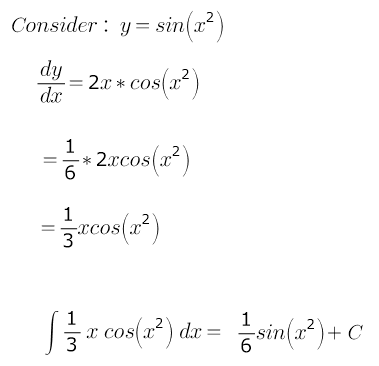Confused on how to do this (Integration C4)

Alright so I'm confused on how to integrate this with recognition / applying chain rule in reverse.
I know it can be solved with other methods eg: IBS, but would like to know how to do it, the other way.
Original post by SaadKaleem
Alright so I'm confused on how to integrate this with recognition / applying chain rule in reverse.
I know it can be solved with other methods eg: IBS, but would like to know how to do it, the other way.

Alright so I'm confused on how to integrate this with recognition / applying chain rule in reverse.
I know it can be solved with other methods eg: IBS, but would like to know how to do it, the other way.
The important thing to note here is that integration by substitution is exactly the same thing as recognition/applying the chain rule in reverse, just a slightly different way of looking at it.
So here, you can see you have an integrand of the form . So you can immediately see that it'll integrate to something like (up to a constant factor blah blah).
So what you do is
Your integrand is so you want to turn the 2 into a 1/3.
The way to do this is:
So integrating gives you by recognition.
With enough practice, you'll be able to skip the step of writing down and be able to jump straight to the answer, I will stress that this comes with practice, so for now - stick with writing the derivative.
Original post by SaadKaleem
Alright so I'm confused on how to integrate this with recognition / applying chain rule in reverse.
I know it can be solved with other methods eg: IBS, but would like to know how to do it, the other way.

Alright so I'm confused on how to integrate this with recognition / applying chain rule in reverse.
I know it can be solved with other methods eg: IBS, but would like to know how to do it, the other way.
Alright so I usually have a hard time explaining integration by recognition but here goes.
First of all, take some sort of a "guess". Smart guess of course.
With this integral I would say
As the integral of cosx is sinx
This line is basically saying my guess is that this will integrate to
Now, once you've made this guess, you differentiate it to see if you get what you're trying to integrate.
You can see this is very close to the main integral, but its 6 times too big.
So from that you will know that the main question integrates to
I hate explaining integration by recognition, I find it hard to explain

Though Zacken has beat me to it anyway

Original post by B_9710
-----.
Original post by Zacken
-----
Original post by edothero
-----
Wow thank you all for the fast responses, yeah that was a bit dumb moment for me, Should've considered sin(x^2)... lol

Anyways, I've understood it.


Original post by SaadKaleem
Wow thank you all for the fast responses, yeah that was a bit dumb moment for me, Should've considered sin(x^2)... lol 
Anyways, I've understood it.


Anyways, I've understood it.


Hmm... .

Original post by Zacken
Hmm... . 

Damn, I've been making that mistake, I guess.
But can't it be used as a check that multiplying by 1/6 would equal the dy/dx value to the original integrand? So, we'd now also need to multiply by 1/6 to the value we've considered?
Original post by SaadKaleem
Damn, I've been making that mistake, I guess.
But can't it be used as a check that multiplying by 1/6 would equal the dy/dx value to the original integrand? So, we'd now also need to multiply by 1/6 to the value we've considered?
But can't it be used as a check that multiplying by 1/6 would equal the dy/dx value to the original integrand? So, we'd now also need to multiply by 1/6 to the value we've considered?
I'm just saying that your notation is off.
Don't write .
Write: so .
Remember, equal signs mean that's what's on the left is exactly what's on the right.
Original post by Zacken
I'm just saying that your notation is off.
Don't write .
Write: so .
Remember, equal signs mean that's what's on the left is exactly what's on the right.
Don't write .
Write: so .
Remember, equal signs mean that's what's on the left is exactly what's on the right.
Ah, I see. Will definitely be careful on that.
Thank you as always Zacken!

Original post by SaadKaleem
Ah, I see. Will definitely be careful on that.
Thank you as always Zacken!
Thank you as always Zacken!

No problem.

Original post by Zacken
No problem. 

Hi, I was wondering if you can also do this with integration by parts? I tried to do it but I got no where
Original post by SirRaza97
Hi, I was wondering if you can also do this with integration by parts? I tried to do it but I got no where
Nopes, not possible.
Original post by Zacken
Nopes, not possible.
Why not? Is it not 2 functions?
Original post by SirRaza97
Why not? Is it not 2 functions?
So? It's not just because it's two functions that it means that it's integrable by parts.
Original post by Zacken
So? It's not just because it's two functions that it means that it's integrable by parts.
Then what am I missing? Because in a C4 exam I would've thought "Oh that's integration by parts". I am obviously not understanding something.
Original post by SirRaza97
Then what am I missing? Because in a C4 exam I would've thought "Oh that's integration by parts". I am obviously not understanding something.
The fact that the Fresnel integrals aren't really available to A-Level students... In a C4 exam, you'd be given the sub of or meant to do it by recognition as above.
Original post by Zacken
The fact that the Fresnel integrals aren't really available to A-Level students... In a C4 exam, you'd be given the sub of or meant to do it by recognition as above.
Okay... your explanations are very bland. But thanks anyways.
Original post by SirRaza97
Okay... your explanations are very bland. But thanks anyways.
No problem.
Quick Reply
Related discussions
- Edexcel A2 Mathematics: Core Mathematics C4 6666 01 - 22 June 2018 [Exam Discussion]
- A-level maths help!
- Applied Calculus Help
- Maths parametric integration
- King's transfer using foundation year grades
- Help I don’t understand integration
- Master's Funding
- Need help with Integration
- Maths: Integration
- Maths - variable acceleration
- Further maths integration help
- how tf do i start??? hyperbolics integration question
- A-level Maths, Integration, Finding area between curves & Lines.
- Alevel maths q help needed
- Postgraduate Master's Loan - 2
- A level integration help
- Integration
- Barometric Formula Isaac Physics
- calculating lift co efficient using integration
- Parametrics
Latest
Trending
Last reply 4 days ago
Did Cambridge maths students find maths and further maths a level very easy?Last reply 2 weeks ago
Edexcel A Level Mathematics Paper 2 unofficial mark scheme correct me if wrongMaths
71
Trending
Last reply 4 days ago
Did Cambridge maths students find maths and further maths a level very easy?Last reply 2 weeks ago
Edexcel A Level Mathematics Paper 2 unofficial mark scheme correct me if wrongMaths
71



